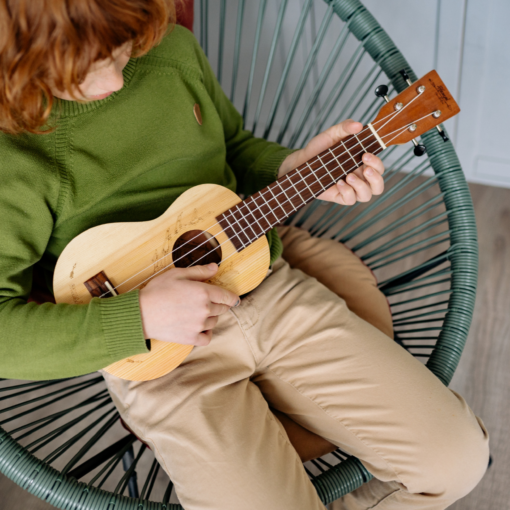After an initial spark of inspiration your child suddenly has ZERO interest in learning a musical instrument… so what now? It’s a question all parents of budding musicians have had to battle with. According to our music instructors the question, ‘How do I keep my child motivated at home?’ is commonly asked by many parents.
While it may seem that your child’s entire musical education is at stake when they refuse anything to do with the topic, please take comfort in the fact that this is very normal!
Whether they adore their instrument or have only just begun to get to grips with it, there will always be the odd day when your child claims that they will never ever ever sit at the piano or pick up their guitar again. Don’t worry, we’ve seen this happen many times.
Here are our top tips for creating a culture of motivated music practice and swerving the meltdowns.
1. Let them play anything… within reason, of course
The best part of being a musician is freely playing your instrument. So for new starters or those who are struggling to get through a piece note by note, learning music can feel frustrating.
To combat this, try encouraging your child to express themselves through improvisation if they are unable to read music or don’t enjoy doing so.
It may be a little painful to listen to at first, but getting to know their instrument outside of structured practice will help your child to feel more invested.
If a child feels able to express their emotions through playing their instrument they will be more likely to pick it up to play independently.
This might even mean putting on their favorite Disney soundtrack for them to strum along with! No it’s not Mozart, but understanding the joy of music is tantamount to having the motivation to pursue it.
If your child already has a level of musical ability but has hit a plateau, perhaps it is time to bust out their favorite pop song. Let them feel some autonomy over their practice by allowing them to pick an out-of-genre piece to learn, we all like to be rebels from time to time!
A break from the ‘syllabus’ is sometimes all it takes to ignite the spark of interest once more.
2. Motivating Mini-performances
Instead of asking ‘are you going to practice tonight?’, you can ask ‘are you going to do a performance for us tonight?’
Depending on their age and personality, the opportunity to impress you might fill them with excitement.
Later you can suggest that they get ready for their performance by doing a few practice runs, and if you’re lucky that might just work!
Remember that after the ‘performance’ is not the time to offer constructive criticism as your child should learn that performing is a positive experience. Don’t be a judging panel, instead clap and praise their efforts to give them a sense of accomplishment that will keep them coming back for more.
If your child is just starting out and can’t play a full tune, you can ask them to make up a ‘happy’ tune that they can play to you as this is also good improvisation practice.
3. Take them to group practice
Making musical friends is all part of it, and group learning offers your child the opportunity to find inspiration from their peers who are all on the same path.
Group classes can help your child form a sense of identity as a musician, giving them the first taste of how it feels to have the skills to play in a group – an appreciation which they may take to high school, perhaps joining the Marching Band or orchestra.
The group setting also means that your child may feel less pressure when playing than a private one-on-one lesson, especially if they are a shy character.
If your child is competitive, being part of a group can give them the motivation to up their game.
Currently, we focus on private lessons to provide students with the highest level of personalized instruction. However, for those looking for a group experience, we offer Rock Band Camp, where kids can play together, build confidence, and develop teamwork skills during the summer.

4. Shake things up, but keep the structure
If you truly want to see your child learn an instrument you will have to play an integral part to keep your child consistently motivated. You set the standard for structure in your household.
Of course, there are all the old tricks to get children to practice; toys, sticker charts, or their favorite treat every time they sit down at the piano. Yet still, you enrolled your child in music because it is a fantastic way for your child to develop into a well-rounded human and you shouldn’t loose sight of that.
From the beginning, your child should understand that music must be taken seriously. After all, it’s an investment of time and money. Your child should eventually evolve from wanting trinkets to play their instrument over time. If you’ve hinted that music lessons are an option then you’re fighting an uphill battle. Gaining the confidence in learning a new skill takes time and patience that sometimes doesn’t come easily.
Don’t let your child forget that.
If it were easy for us to just walk away from the parts of life we don’t enjoy—like our jobs or daily responsibilities—our lives would look very different. But as adults, we know that sticking with something, even when it’s hard, often leads to growth, stability, and long-term reward. The same can be true for our kids as they learn the value of commitment through music. As a parent, you should allow your child to go through the ups and downs without calling it quits. Staying motivated is a life lesson best learned early.
5. Targeted practice
A much more favorable and sustainable option in staying motivated is teaching your child how to recognize the small advancements they make during each practice session, and allowing that to be their reward.
Targeting small sections of the music, even focusing on just a few bars during a 15 minute practice session, should see an immediate improvement. Give them positive reinforcement as they tackle the small section that they have found hard.
Refer to any notes from your child’s teacher to see if they have set any points to focus on during practice. Alternatively, try to spot if your child is skipping a section of the music that they’d rather not play, that could be a problem area.
At times, your child might not want to practice – especially if they are several years into their musical education – and if they seem to be doing well on their own sometimes it is best to leave them to it.
However, if you’ve noticed that they are making the same mistake in a passage of music over and over, you should offer them support to dial in on the issue – repeating that specific section for a few minutes until it has improved.
If you don’t play music yourself it can be hard to identify what your child is struggling with, but even finding the piece online and playing that section of the music to them a few times can be helpful.
Guiding them through a structured practice session—even if it takes a bit of firmness—is one of the best ways to help them learn how to practice effectively on their own. Motivate your child to practice correctly to avoid issues later.
Having goals such as performances to work towards can also help keep practice on track – speak to your child’s teacher for direction if you need help getting things back on track or reach out to us.
6. Keep them motivated with live music
It might not be possible in the midst of a pandemic, but we all know that music sounds better live, and the benefits don’t stop there.
Having your youngsters experience live music can help them make the realization that the music in their electronic devices is created by real people, musicians. This may seem obvious to us, but for children who have grown up never seeing a musician it is not an easy connection to make.
Research carried out by Apollo Music Projects (AMP) 1 found that 82 percent of children felt ‘positive’ during a live chamber orchestra performance. More than half of the 574 children who took part said they felt more calm and relaxed as they listened.
An incredible 68 percent of the children said they felt inspired to take up an instrument after watching live music.
Watching the live performances also helped the children’s listening and concentration skills develop, with most of their teachers noticing a difference, the study found.
With so much of our lives now centered around a screen, having real life musical experiences is vital in teaching our children what a magical dream pursuing music can be!
To conclude, your child may not yet fully understand why you’re working so hard to keep them motivated in this life-enriching activity, but if you’re able to help them connect with their instrument even on a ‘fun’ or ‘playful’ level this is a great start.
Our Music Studio Has Motivated Kids For Over 10 Years!

For beginner students with little to no experience, we have designed a supportive and engaging curriculum that builds a strong musical foundation, develops essential skills, and fosters a love for playing.
Check out our classes to learn more about the private lessons we offer.






